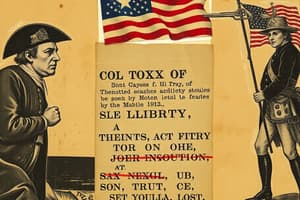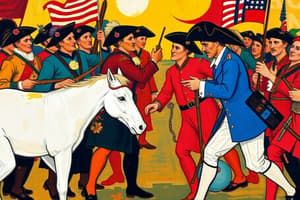Podcast
Questions and Answers
What is a key principle of republicanism as described in the grievances?
What is a key principle of republicanism as described in the grievances?
- Strong centralized government control
- Prioritizing individual wealth over society
- Citizens prioritizing the common good (correct)
- Maintaining strict societal hierarchies
How did Britain typically approach colonial governance prior to the conflicts?
How did Britain typically approach colonial governance prior to the conflicts?
- Through direct and strict enforcement of laws
- Exclusively through naval power and military presence
- By allowing self-governance and Salutary Neglect (correct)
- Implementing heavy taxes without local consent
What was the main objective of the Navigation Laws enacted by Britain?
What was the main objective of the Navigation Laws enacted by Britain?
- To enforce mercantilist policies and restrict colonial trade (correct)
- To encourage colonies to develop their own manufacturing
- To eliminate smuggling activities in the colonies
- To promote free trade between colonies
Which act required the colonies to provide housing for British soldiers?
Which act required the colonies to provide housing for British soldiers?
What triggered widespread protest and the concept of 'taxation without representation' among colonists?
What triggered widespread protest and the concept of 'taxation without representation' among colonists?
What was the primary purpose of the Committees of Correspondence established in 1772?
What was the primary purpose of the Committees of Correspondence established in 1772?
Which event is commonly known as the 'shot heard 'round the world'?
Which event is commonly known as the 'shot heard 'round the world'?
What was a significant consequence of the Intolerable Acts passed in 1774?
What was a significant consequence of the Intolerable Acts passed in 1774?
Which act imposed taxes on glass, paper, and tea, leading to widespread boycotts by colonists?
Which act imposed taxes on glass, paper, and tea, leading to widespread boycotts by colonists?
What was the main outcome of the First Continental Congress held in 1774?
What was the main outcome of the First Continental Congress held in 1774?
What was the primary goal of the Second Continental Congress in 1775?
What was the primary goal of the Second Continental Congress in 1775?
Which event boosted colonial confidence despite being a British victory?
Which event boosted colonial confidence despite being a British victory?
What did the Olive Branch Petition represent?
What did the Olive Branch Petition represent?
Which document did Thomas Jefferson draft that asserted natural rights?
Which document did Thomas Jefferson draft that asserted natural rights?
Who introduced the idea of independence in June 1776?
Who introduced the idea of independence in June 1776?
What characterization best describes the Patriots during the American Revolution?
What characterization best describes the Patriots during the American Revolution?
Which battle is considered the turning point of the American Revolutionary War?
Which battle is considered the turning point of the American Revolutionary War?
What was a significant challenge faced by Washington's troops at Valley Forge?
What was a significant challenge faced by Washington's troops at Valley Forge?
What role did the French Alliance play in the American Revolution?
What role did the French Alliance play in the American Revolution?
What was the British Southern Strategy during the American Revolution?
What was the British Southern Strategy during the American Revolution?
What significant event took place in 1781 that led to the surrender of British General Cornwallis?
What significant event took place in 1781 that led to the surrender of British General Cornwallis?
What was one of the outcomes of the Treaty of Paris in 1783?
What was one of the outcomes of the Treaty of Paris in 1783?
Which of the following was true regarding the treatment of Loyalists after the Treaty of Paris?
Which of the following was true regarding the treatment of Loyalists after the Treaty of Paris?
Which forces combined to surround the British at the Battle of Yorktown?
Which forces combined to surround the British at the Battle of Yorktown?
What geographical boundary did the United States gain as a result of the Treaty of Paris?
What geographical boundary did the United States gain as a result of the Treaty of Paris?
What significant legal action did the Virginia Statute for Religious Freedom accomplish?
What significant legal action did the Virginia Statute for Religious Freedom accomplish?
Which of the following was a limitation of the Articles of Confederation?
Which of the following was a limitation of the Articles of Confederation?
What was the concept of 'Republican Motherhood' primarily concerned with?
What was the concept of 'Republican Motherhood' primarily concerned with?
How did northern and southern states differ in their approach to slavery during this period?
How did northern and southern states differ in their approach to slavery during this period?
What challenge did the principle of primogeniture face during this historical period?
What challenge did the principle of primogeniture face during this historical period?
What was one of George Washington's primary goals as president?
What was one of George Washington's primary goals as president?
Which action was a direct response to concerns raised by Anti-Federalists?
Which action was a direct response to concerns raised by Anti-Federalists?
What significant event demonstrated Washington's commitment to federal authority?
What significant event demonstrated Washington's commitment to federal authority?
What warning did Washington issue in his farewell address?
What warning did Washington issue in his farewell address?
Which economic proposal was NOT part of Washington's agenda?
Which economic proposal was NOT part of Washington's agenda?
What was the primary purpose of the Northwest Ordinance of 1787?
What was the primary purpose of the Northwest Ordinance of 1787?
How did Shays' Rebellion expose weaknesses in the Articles of Confederation?
How did Shays' Rebellion expose weaknesses in the Articles of Confederation?
What was one significant outcome of the Great Compromise made during the constitutional convention?
What was one significant outcome of the Great Compromise made during the constitutional convention?
Which economic issue contributed to the calls for a stronger national government in the United States during the 1780s?
Which economic issue contributed to the calls for a stronger national government in the United States during the 1780s?
What did the 3/5 Compromise specifically address?
What did the 3/5 Compromise specifically address?
What is the primary purpose of the checks and balances system in the Constitution?
What is the primary purpose of the checks and balances system in the Constitution?
Which of the following best describes federalism as established in the Constitution?
Which of the following best describes federalism as established in the Constitution?
What was a primary concern of the Anti-Federalists regarding the Constitution?
What was a primary concern of the Anti-Federalists regarding the Constitution?
Which of the following amendments is NOT included in the Bill of Rights?
Which of the following amendments is NOT included in the Bill of Rights?
Which group primarily supported a strong central government and the ratification of the Constitution?
Which group primarily supported a strong central government and the ratification of the Constitution?
What was the main consequence of the XYZ Affair during Adams' presidency?
What was the main consequence of the XYZ Affair during Adams' presidency?
Which legislation during Adams' presidency significantly limited immigration and free speech?
Which legislation during Adams' presidency significantly limited immigration and free speech?
What argument did Jefferson and Madison present in the Kentucky and Virginia Resolutions?
What argument did Jefferson and Madison present in the Kentucky and Virginia Resolutions?
What was one of the main motivations behind the enactment of the Alien and Sedition Acts?
What was one of the main motivations behind the enactment of the Alien and Sedition Acts?
How did the public respond to the Alien and Sedition Acts?
How did the public respond to the Alien and Sedition Acts?
Flashcards
Salutary Neglect
Salutary Neglect
Britain's policy of loose enforcement of laws in the American colonies.
Mercantilism
Mercantilism
Economic system where colonies provide raw materials and markets for the mother country.
Stamp Act
Stamp Act
A British tax on paper products in the colonies.
Taxation without Representation
Taxation without Representation
Signup and view all the flashcards
Colonial Grievances
Colonial Grievances
Signup and view all the flashcards
Townshend Acts
Townshend Acts
Signup and view all the flashcards
Boston Massacre
Boston Massacre
Signup and view all the flashcards
Committees of Correspondence
Committees of Correspondence
Signup and view all the flashcards
Boston Tea Party
Boston Tea Party
Signup and view all the flashcards
Intolerable Acts
Intolerable Acts
Signup and view all the flashcards
Patriots
Patriots
Signup and view all the flashcards
Loyalists
Loyalists
Signup and view all the flashcards
Battle of Saratoga
Battle of Saratoga
Signup and view all the flashcards
French Alliance
French Alliance
Signup and view all the flashcards
Valley Forge
Valley Forge
Signup and view all the flashcards
Second Continental Congress
Second Continental Congress
Signup and view all the flashcards
Continental Army
Continental Army
Signup and view all the flashcards
Olive Branch Petition
Olive Branch Petition
Signup and view all the flashcards
Thomas Paine's Common Sense
Thomas Paine's Common Sense
Signup and view all the flashcards
Declaration of Independence
Declaration of Independence
Signup and view all the flashcards
Primogeniture
Primogeniture
Signup and view all the flashcards
Virginia Statute for Religious Freedom
Virginia Statute for Religious Freedom
Signup and view all the flashcards
Republican Motherhood
Republican Motherhood
Signup and view all the flashcards
Articles of Confederation
Articles of Confederation
Signup and view all the flashcards
Abolish Slavery (Northern States)
Abolish Slavery (Northern States)
Signup and view all the flashcards
Battle of Yorktown
Battle of Yorktown
Signup and view all the flashcards
Cornwallis's Surrender
Cornwallis's Surrender
Signup and view all the flashcards
Treaty of Paris (1783)
Treaty of Paris (1783)
Signup and view all the flashcards
American Independence
American Independence
Signup and view all the flashcards
Loyalist Treatment
Loyalist Treatment
Signup and view all the flashcards
Land Ordinance of 1785
Land Ordinance of 1785
Signup and view all the flashcards
Northwest Ordinance of 1787
Northwest Ordinance of 1787
Signup and view all the flashcards
Shays' Rebellion
Shays' Rebellion
Signup and view all the flashcards
Great Compromise
Great Compromise
Signup and view all the flashcards
3/5 Compromise
3/5 Compromise
Signup and view all the flashcards
Separation of Powers
Separation of Powers
Signup and view all the flashcards
Checks and Balances
Checks and Balances
Signup and view all the flashcards
Federalism
Federalism
Signup and view all the flashcards
Federalists
Federalists
Signup and view all the flashcards
Anti-Federalists
Anti-Federalists
Signup and view all the flashcards
XYZ Affair
XYZ Affair
Signup and view all the flashcards
Alien and Sedition Acts
Alien and Sedition Acts
Signup and view all the flashcards
Kentucky and Virginia Resolutions
Kentucky and Virginia Resolutions
Signup and view all the flashcards
Nullification
Nullification
Signup and view all the flashcards
Quasi-War with France
Quasi-War with France
Signup and view all the flashcards
Washington's Cabinet
Washington's Cabinet
Signup and view all the flashcards
Bill of Rights
Bill of Rights
Signup and view all the flashcards
Whiskey Rebellion
Whiskey Rebellion
Signup and view all the flashcards
Washington's Farewell Address
Washington's Farewell Address
Signup and view all the flashcards
Two-Term Presidency
Two-Term Presidency
Signup and view all the flashcards




